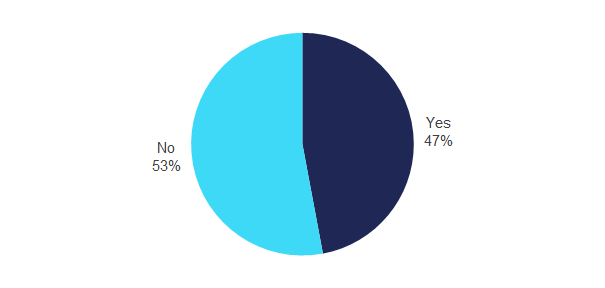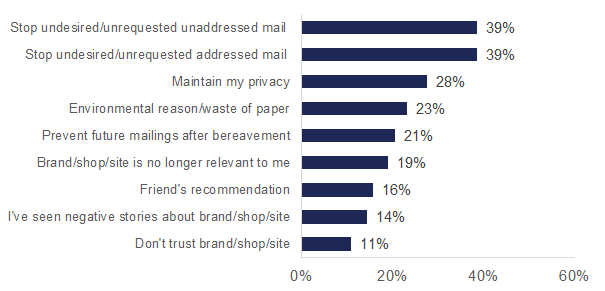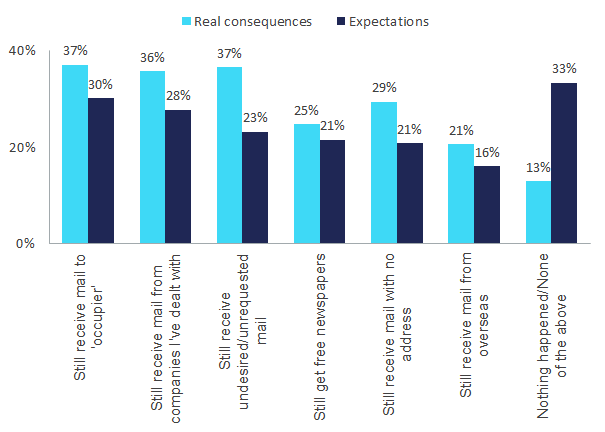MPS: What Consumers Say
20 Dec 2021

Welcome to this short article series dedicated to the Mailing Preference Service (MPS).
The MPS was developed by the DMA in 1983, funded by licence revenue and ASBOF. Despite not being a legal regulation, it’s a requirement under the DMA and CAP codes (respectively).
The MPS is a service that enables consumers to have their names and addresses in the UK removed from lists used by the industry and, ultimately, receive only the mail they want. On the other hand, the MPS allow businesses to respect their consumers’ wishes and not waste time and resources sending marketing messages that are not welcome.
In other words, the MPS is a win-win service, for both consumers and businesses who are keen to save time and energy as well as interested in building valuable relationships.
This article focuses on the findings of a survey conducted in July 2021 of over 2000 nationally representative UK consumers – further details can be found in the ‘Methodology’ section at the end of this article. We asked them about their knowledge and thoughts of the mail preference services and the MPS to gather insights from their direct experience and inspire future development.
As listening to both sides of a story is key when you want to learn how you can improve, we also asked marketers to share their experience – read the article here.
Mail Preference Services - Awareness
Half of consumers (51%) say they are aware of the legal regulation around mail services, slightly less than in 2020 when 55% said to be knowledgeable about them.
Almost half (47%) also declare they are aware of MPS’ services, similar to the previous year (48%). They’ve mostly learned about the services via the internet (21%), a friend/colleague (19%) and TV (18%).
Before today, were you aware of the Mailing Preference Service (MPS)?

Mail Preference Services - Experience
Half of consumers (49%) have registered their main home address with the MPS, with 51% saying they haven’t signed up. In 2020, 54% didn’t have their address registered and 13% didn’t know if they had registered it.
Among all the available options as the main reason to register with the MPS, consumers selected stopping undesired mail that isn’t addressed directly to them (39%), stopping mail specifically addressed to their person (39%), and maintaining their privacy (28%).
Why did you decide to register your address with the Mailing Preference Service (MPS)?

On the other hand, those who didn’t register their main home address with MPS, said it was mainly due to a lack of knowledge about where to look for information (31%) and a lack of interest in the services (20%).
After registering for the MPS` services, which of the following options do you expect to happen? AND What actually happened after you registered for the MPS` service?

Consumers’ expectations towards MPS’s services were lower and more negative than the actual results they have experienced.
Indeed, 33% were expecting that nothing would happen after their registration but, effectively, only 13% of consumers didn’t see any changes after registering their address with the MPS.
On the other hand, it seems there is still some confusion around the actual services the MPS covers. Indeed, about one in three, after registering their main home address, would expect to stop receiving mail addressed to ‘the occupier’ (37%) or from businesses they have previously dealt with (36%).
What’s in it for the customer?
To summarise, the benefits the MPS offers consumers that decide to register as either an individual or their entire households are:
- Free registration (no requirement to renew)
- The chance to reduce unsolicited personally addressed mail
- The opportunity to create more functional connections with brands and businesses
Over the year the MPS have collected over 6.5 million registrants and helped reduce the receipt of unsolicited mail. Such great achievement has been recognised by the Advertising Standards Authority (ASA) and it’s fully supported by the Information Commissioner’s Office (ICO).
As mentioned in the introduction, we also asked marketers to share their perspective and experience with us – here you can read the dedicated article.
If this article has left you keen to learn more about the MPS and what it can offer to you and your business, visit the website.
Furthermore, the IDM has the perfect course to provide you with a great understanding of data protection, privacy and responsible marketing:
Responsible Marketing: Privacy, compliance and the law
Methodology
The research was conducted in July 2021 via an online survey of 2002 respondents (nationally representative of GB adults). The respondents were 49% male and 51% female living in East of England (9%), Greater London (13%), East Midlands (7%), West Midlands (9%), North East (4%), North West (11%), Northern Ireland (3%) and Scotland (8%).
Respondents were also equally distributed across the different age groups - 12% (18-24 y.o.), 18% (25-34 y.o.), 15% (35-44 y.o.), 17% (45-54 y.o.), 38% (55+ y.o.) and living areas - 23% urban, 42% suburban, 20% small town, 15% rural area
The data was collected by Census Wide then analysed by the DMA Insight team. The article was written and designed by the DMA Insight department. Unless referenced, all data included in this article is taken from this survey.
If you have any questions about the methodology used in the article, you can contact the DMA’s Insight team via email: research@dma.org.uk.




Please login to comment.
Comments